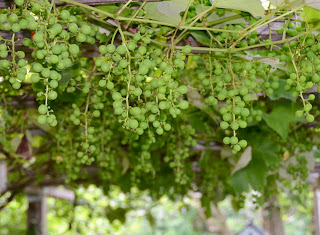We have an abundance of fruit this year. Some of them are surprises. We planted two currant bushes several years ago and had enough berries last year to make a little bit of currant sauce. This year we have more than I can pick and perhaps more than we can actually use.
Yesterday I made nine 8 ounce jars of currant jam - three from the champagne currants and six from the red currants. I picked more today, until I got tired in the heat that we are having. We don't need more jam but might make a currant pie. We don't see any bird or other damage to the currants, which is a surprise.
We also have a good crop of cherries this year for the first time. The trees were planted at about the same time as the currants. They are sour cherries and that seems to have a real benefit. Although some of the cherries have bite marks in them, the birds do not seem very interested in them. I saw a squirrel eat one but otherwise it seems the squirrels don't like them. So we keep picking and freezing them and eventually will make a pie and some jam from them.
The concord grapes did poorly last year, probably because of the early warm weather followed by freezing temperatures. This year, as shown in the photograph, there are far too many. This is after I pruned out a lot of the canes that had little grape clusters. I still haven't devised a method of pruning grapes and the result is that there is too much fruit. I fear that the plants will not be able to sustain the growth and develop this many clusters but don't know what to do at this point other than let them try. Hopefully there is now enough growth over the arbor that I can effectively prune them next year to provide a sensible amount of fruit. Like the currants and cherries, the grapes, at least in past years, have not been eaten by birds or squirrels.
We also have several gooseberry plants that have a good crop. We haven't picked any yet. Since they are between the compost bin and the fence around the vegetable garden and have thorns harvesting may be difficult.
Subscribe to:
Post Comments (Atom)



No comments:
Post a Comment